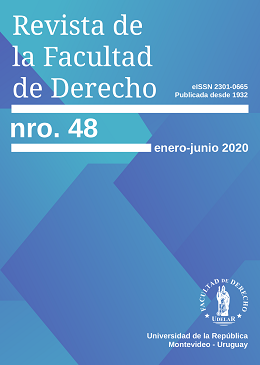The Direct Action Institute for Possession Defense in the Portuguese Civil Code:
some notes
DOI:
https://doi.org/10.22187/rfd2020n48a3Keywords:
Possession, Direct Action, Private Guardianship, Civil LawAbstract
The institute of direct action in the possession defense is provided for in article 1277 of the Portuguese Civil Code. It is legitimate to resort to direct action when there is a danger of practically invalidating a subjective right. The aim of this paper is to discuss the assumptions and conditions for direct action to occur. The elaboration was based on a revisit of the Roman Private Law, the Ordinances and the various Political Constitutions until the present Civil Code. The institute is discussed on the basis of a systematic review of national doctrine and under the jurisprudence eyes. It is structured in three parts: 1. The direct action; 2. The assumptions of direct action; 3. The effects of direct action. It follows that this institute is an exceptional case in which the State places certain coercive powers in the hands of privates, to ensure the realization of a right protected by law in other ways, when they are generally conferred only on public authorities. The legislator defined a set of assumptions (art. 336 of CC) for the exercise of this institute, stating that all must be guaranteed. In the mistaken assumption that they occur , the action gives rise to compensation for the damage caused.
Downloads
References
Ascenção, O. (2002). Direito Civil – Reais. Coimbra, Portugal: Coimbra Editora.
Bennett, H. (Produtor) & Nimoy, L. (Realizador) (1984). Star Trek III – The Search for Spok [DVD 2009]. AParamount Pictures.
Bonito, J. (2019). A Prossecução do Interesse Público pela Admnistração Pública: Algumas Notas em Contexto Português. Direito Público, 15(85), 936. Disponível em https://www.portaldeperiodicos.idp.edu.br/direitopublico/ article/view/3202.
Caetano, M. (2013). Manual de Direito Administrativo (Vol. II). Coimbra, Portugal: Almedina.
Cordeiro, M. (1993). Direitos Reais. Lisboa, Portugal: LexEdições Jurídicas.
Fernandes, L. C. (2009). Lições de Direitos Reais. Lisboa, Portugal: Quid Juiris.
Leitão, M. (2017). Direitos Reais (6.ª ed.). Coimbra, Portugal: Almedina.
Lopes, A. L. (s.d.). Noções de Teoria Geral do Estado. Belo Horizonte, Brasil. Disponível em http://domtotal.com/direito/uploads/pdf/1627aa4f30ef0e7c1b1 49fccd97700c2.pdf.
MJ – Ministério da Justiça (1998). Boletim do Ministério da Justiça, 473.
MJ – Ministério da Justiça (1999). Boletim do Ministério da Justiça, 483.
Moncada, C. (1995). Lições de Direito Civil. Coimbra, Portugal: Almedina.
Portugal, Acórdão do Supremo Tribunal de Justiça. Proc. n.º 039534 (18/05/1988). Preto, M. Unanimidade. Disponível em http://www.dgsi.pt/jstj.nsf/ 954f0ce6ad9dd8b980256b5f003fa814/bbf01378abab032f802568fc0039346e ?OpenDocument.
Portugal, Acórdão do Supremo Tribunal de Justiça. Proc. n.º 97A862 (26/03/1998). Triunfante, L. Unanimidade. Disponível em https://jurisprudencia.csm.org.pt/ ecli/ECLI:PT:STJ:1998:97A862.
Portugal, Acórdão do Tribunal da Relação do Porto. Proc. n.º 9821342 (21/05/1999). Soares, E. Unanimidade. Disponívelemhttp://www.dgsi.pt/jtrp.nsf/56a6e712165 7f91e80257cda00381fdf/d121ee9dddf262d28025686b00672854?OpenDocument
Rodrigues, M. (1996). A Posse. Coimbra, Portugal: Almedina.
Kaser, M. (2011). Direito Privado Romano. Lisboa, Portugal: Fundação Calouste Gulbenkian.
Sallin, R. (Produtor), & Meyer, N. (Realizador). (1982). Star Trek II– The Wrath of Khan [DVD 2009]. AParamount Pictures.
Santo Agostinho (1995). O LivreArbítrio (2.ª ed.). São Paulo, Brasil: Paulus.
Silva, M. (1968). Da Tutela dos Direitos da Ação Direta. Disponível em https://portal. oa.pt/upl/%7B99f070e431a84d04be181d8b0d7e680b%7D.pdf.
Souza, M. A. (1829). Tractado Encyclopedico, Compendiario, Pratico, Systematico dos Interdictos, e Remedios Possessorios conforme o Direito Romano, Patrio, e Uso das Nações. Lisboa: Impressão Regia. Disponível em http://purl.pt/ 11446/1/index.html#/7/html.
Published
How to Cite
Issue
Section
License
This journal provides open access to its content, based on the principle that providing the public with free access to research helps a greater global exchange of knowledge
Revista de la Facultad de Derecho. Creative Commons Reconocimiento 4.0 Internacional License.


